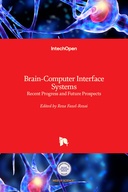Explore

Brain-Computer Interface Systems
0 Ungluers have
Faved this Work
Login to Fave
Brain-Computer Interface (BCI) systems allow communication based on a direct electronic interface which conveys messages and commands directly from the human brain to a computer. In the recent years, attention to this new area of research and the number of publications discussing different paradigms, methods, signal processing algorithms, and applications have been increased dramatically. The objective of this book is to discuss recent progress and future prospects of BCI systems. The topics discussed in this book are: important issues concerning end-users; approaches to interconnect a BCI system with one or more applications; several advanced signal processing methods (i.e., adaptive network fuzzy inference systems, Bayesian sequential learning, fractal features and neural networks, autoregressive models of wavelet bases, hidden Markov models, equivalent current dipole source localization, and independent component analysis); review of hybrid and wireless techniques used in BCI systems; and applications of BCI systems in epilepsy treatment and emotion detections.
This book is included in DOAB.
Why read this book? Have your say.
You must be logged in to comment.
Rights Information
Are you the author or publisher of this work? If so, you can claim it as yours by registering as an Unglue.it rights holder.Downloads
This work has been downloaded 50 times via unglue.it ebook links.
- 24 - pdf (CC BY) at Unglue.it.
- 26 - pdf (CC BY) at mts.intechopen.com.
Keywords
- Human-computer interaction
- thema EDItEUR::U Computing and Information Technology::UY Computer science::UYZ Human–computer interaction
Links
DOI: 10.5772/50696Editions

